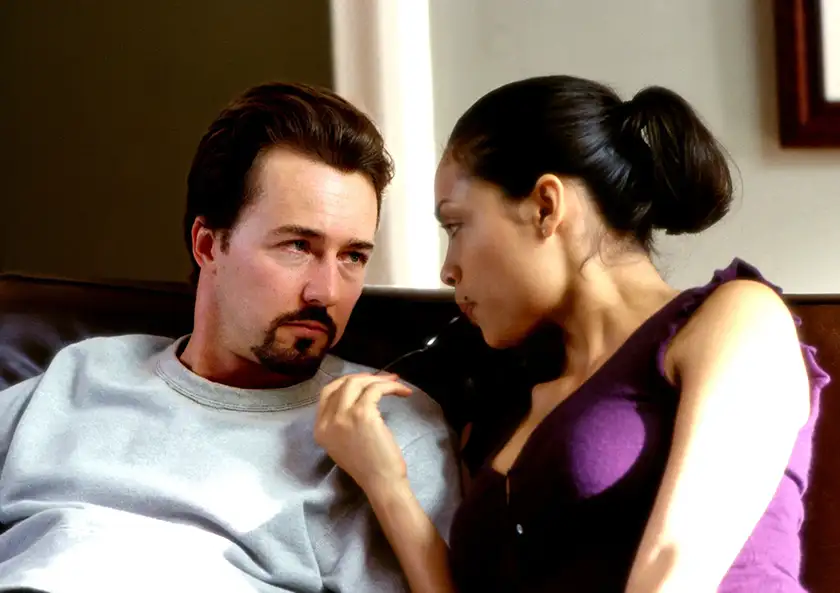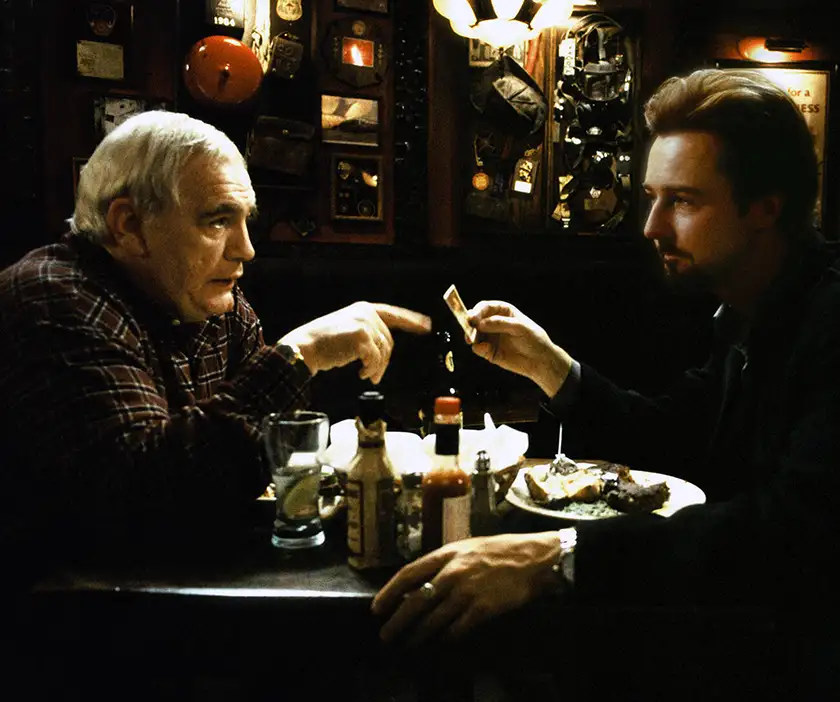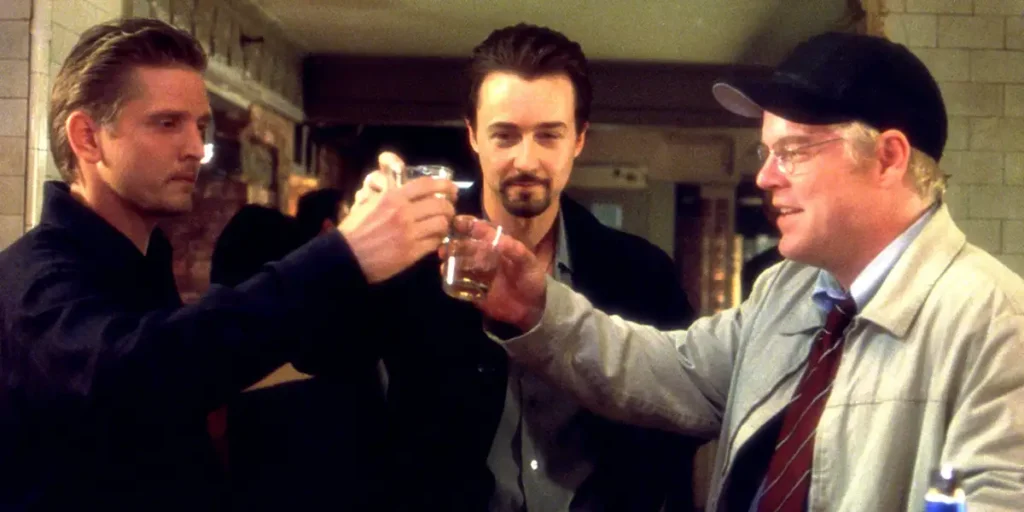Almost no movie shows the impact of pressure better than Spike Lee’s 25th Hour, using an all-star cast, including Philip Seymour Hoffman.
Director: Spike Lee
Writer: David Benioff
Genre: Prison Drama
Run Time: 135′
US Release: December 19, 2002
UK Release: April 25, 2003
Where to watch 25th Hour: on digital platforms & VOD
Pressure. Stress. Strain. Tension. Anxiety.
There is nothing quite like these feelings. It changes everything. The simplest, most basic tasks will suddenly seem impossible to consider, let alone actually achieve. Those who can perform under pressure are a different breed. People who constantly live under this strain are either immune to it or are being slowly crushed by it without our knowledge.
There could be many names for these people, but one comes to my mind immediately: New Yorkers. And almost no movie shows the impact of pressure better than Spike Lee’s 25th Hour.
Given the main character’s predicament, it would be easy to dismiss that as the reason for the pressured behavior and overall feel of the movie. After all, 25th Hour follows Monty Brogan (Edward Norton, of Asteroid City) on the night before he is set to serve a 7-year prison sentence for drug offenses. This alone is enough to make the best of us sweat bullets. But the film does not only follow him, but his good friends, his girlfriend, and to a lesser extent, his father. And each of them, especially in a just post 9/11 New York City, all feel this for different reasons. New York, of course, has countless nicknames, but more than that, it is a pressure cooker. The City That Never Sleeps is not for the faint of heart or overly sensitive.
Monty, even when surrounded by those that he purports to love, feels both alone and smothered. The film, and Spike Lee as the guiding force, does a tremendous job of building this feeling to a boiling point. It is testament to the craft that this is achieved, because Monty is already stressed and angry as the movie opens. But it all builds to a startling crescendo as he launches into a monologue spat into his reflection. It begins as a list of grievances against not only New Yorkers in general, but to specific groups, and even the city itself. Importantly, it ends with a diatribe by Monty against Monty. No one is safe from his vitriol while he is trapped in a corner, least of all himself. He ends with, “No. No, f*** you, Montgomery Brogan. You had it all, and you threw it away, you dumb f***!” This is the pressure of the city turned outward, inward, and every other direction imaginable.

Monty’s girlfriend, Naturielle Riveira (Rosario Dawson, recently of Ahsoka) is under her own brand of pressure. Monty, since his arrest and subsequent sentencing has become increasingly distant. Throughout the runtime of the film, because we are mostly in his perspective, Naturielle vacillates between untrustworthy, an object of desire, and eventually, the love of his life. Although it is a loud and boisterous performance, Dawson somehow manages to be believable and measured in all of these many sides. A role that easily could have become simply a stock girlfriend character becomes genuine, heartfelt, and, in moments, painful.
One could also view 25th Hour as a film about male friendship. It may not paint the best picture of us men, but it is hard to argue with the reality of these interactions. Monty’s friends, Jacob (Philip Seymour Hoffman, of Magnolia) and Frank (Barry Pepper), fulfill drastically different roles in his life and it comes as no surprise that they have little in common.
Jacob is a schoolteacher who has wildly inappropriate thoughts about a student, Mary (Anna Paquin, of The Piano). Lee never shies away from the disturbing feelings that Jacob has, but he also, using the greatest actor of a generation, makes you feel for his desire. Hoffman, of course, is the perfect choice for a character who embodies both romanticism and disgust and it all culminates in a disturbing scene in the bathroom of the bar where Monty and pals spend their last night of freedom.
Frank, on the other hand, seems somehow worse. He works as a Wall Street trader, and, as such, is emblematic of greed and shortcuts. Although he is legally clean, Frank has committed many worse moral crimes than Monty could ever dream. In comparison to even handling of Jacob, the script (adapted by David Benioff of Game of Thrones infamy) has no qualms of showing what a hideous version of male debauchery Frank represents. In an impeccably acted scene between Pepper and Hoffman in a diner, Frank delineates himself from Jacob using only measurements focused on the most superficial reasons; mainly money, looks, and occupation. Frank is clear that what is inside does not matter, and he is unfortunately quite convincing throughout. 25th Hour has several different points of view, but this one is deeply nihilistic in its view of relationships. Both Jacob and Frank feel pressure, one the pressure of what he shouldn’t do and the other the pressure of what he does every day. They both, in the end, eschew morals for their own desires.
And finally, we come to the most important relationship in 25th Hour. Again, the script and direction masterfully distracts the audience with those of Monty’s peer group. Monty avoids his father, James (Brian Cox, of Succession), until essentially the close of the film. But these two acting heavyweights, Norton and Cox, are worth the wait. They meet twice during the runtime, once for Monty to have a drink and scream at the mirror in the bathroom, but the second meeting is where the entire movie gels together into one of Spike Lee’s best films (a tall order anyway).

The pressure of parenthood generally, and fatherhood in particular, especially in a city full of dangers like New York, must seem like an insurmountable task. And James is in a place where there is almost no chance at success. His son is going to jail for what seems like forever, with no real skills other than those connected to criminality. It would be easy for James to do what Monty wants and let him use transit to report to jail. But James cannot allow this, he cannot give in to the pressure to take the easy way out. Instead, he piles in the car with his son for one last heart to heart.
The close of the film, another stroke of genius, allows the viewer to make a choice. Does Monty bow to the pressure and choose a life of possible pursuit by the law (no matter the rosy picture painted by dear old Dad), or will he report, as he is ordered, to his prison sentence? 25th Hour doesn’t give you an easy answer, because there are none. When placed in the pressure cooker of life, we are forced to make choices. Some are clearly binary in their good v bad (no one is saying Jacob should have a relationship with his underage student), but many are morally gray. Should Monty go on the run and hopefully have a hidden, but quality life? Or should he stay true to his word? It is not for us to decide, nor anyone else. Monty has to make his own choice. Pressure can make us heroes or cowards, criminals or saints, traitors or loyal partners. The choice is only up to us.
25th Hour is now available to watch on digital and on demand. Read our reviews of Malcolm X, BlacKkKlansman, Mo’ Better Blues and Da 5 Bloods!
Loud and Clear Reviews has an affiliate partnership with Apple, so we receive a share of the revenue from your purchase or streaming of the films when you click on the button on this page. This won’t affect how much you pay for them and helps us keep the site free for everyone.

